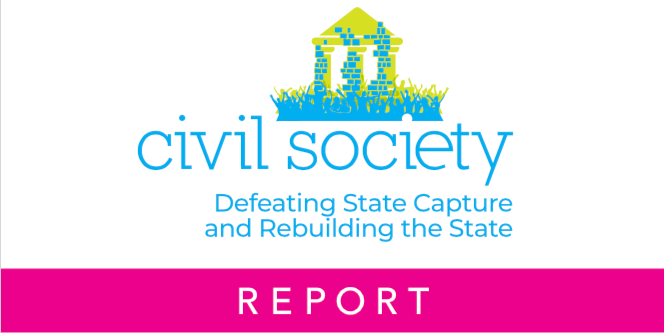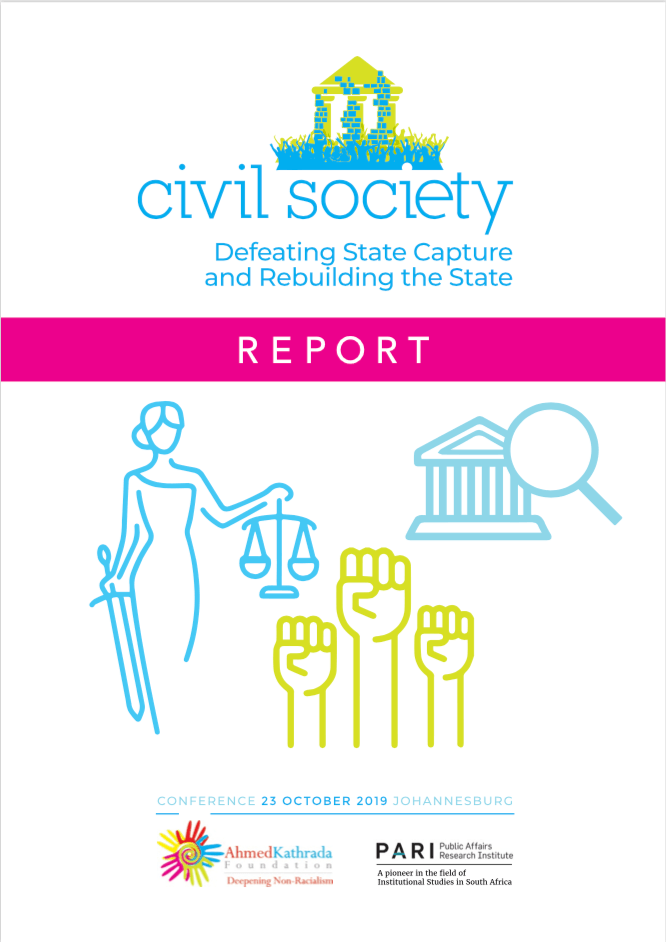The Ahmed Kathrada Foundation and the Public Affairs Research Institute (PARI) hosted a conference entitled: Civil Society – Defeating State Capture and Rebuilding the State on 23 October 2019.
The conference was held at Mancosa Campus, Johannesburg and was attended by civil society representatives, academics, and individuals interested in the issues.
The conference built on activities undertaken by both the Foundation and PARI to analyse and understand the effects of state capture and patronage, to bring together a range of organisations to take action against state capture, as well as to rebuild state institutions through proposals for reform.
Over the past two years, various initiatives have been undertaken by organisations, both individually and collectively, to tackle state capture.
This included a civil society conference against state capture hosted by the Foundation in 2017, and a 2018 conference by PARI.
Several commissions of inquiry have been established to probe and unravel the network propping up the shadow state, various investigative media reports have revealed the depth of capture and research and analysis has been conducted into its impact on our political and economic stability.
While there has been a renewed energy within the civil society space to contribute towards rebuilding a state severely decimated by years of capture, there are worrying signs that there are attempts to ‘fightback’ against initiatives which
aim to address the problems.
We have seen a concerted attack against members of the media, the judiciary, political leaders, organisations, public servants and others who have taken a decisive stance against state capture.
The ‘tug of war’ between those implicated in state capture and those who aim to eradicate it is evident within state owned institutions, in all tiers of government, in various cases brought to court and in attempts to mobilise popular support.
The 2019 conference allowed for civil society to take stock of where it is in the fight against state capture and map out what needs to be done do to confront the current ‘fightback’.
It also assessed progress on mechanisms put in place to address the effects
of state capture on different state institutions, and presented proposals in several areas of state reform in order to insulate the public service from improper political interference.
Topics under discussion included:
- – How state capture continues to erode Constitutional democracy;
- – Where to from the Commission of Inquiry into Allegations of Improprietyregarding the Public Investment Corporation (PIC Commission) and the Commission of Inquiry into Tax Administration and Governance by SARS (Nugent Commission); and how to act on evidence emerging from the Commission of Inquiry into Allegations of State Capture (Zondo Commission);
- – The on-going role of civil society in protecting state institutions from state capture and patronage;
- – Presentation of civil society proposals on key areas of state reform to
minimise the possibilities of improper political interference in state institutions, the public service and public procurement processes; and, - – Strengthening forms of civil society activism against state capture: public advocacy, Parliamentary oversight and lawfare.This report captures the key points from the various discussions that occurred at the conference.
It also includes a Civil Society Charter that emerged from the conference, outlining the key principles that civil society should be advocating for, and objectives it should be putting energy into in the process of defeating state capture and rebuilding the state. We hope that the Charter can provide a broad framework for the type of niche area efforts, and wide scope of work that society should be undertaking over the next few years.
The Foundation and PARI hope that this booklet will be a valuable source of information for any organisation taking a stance against state capture.



